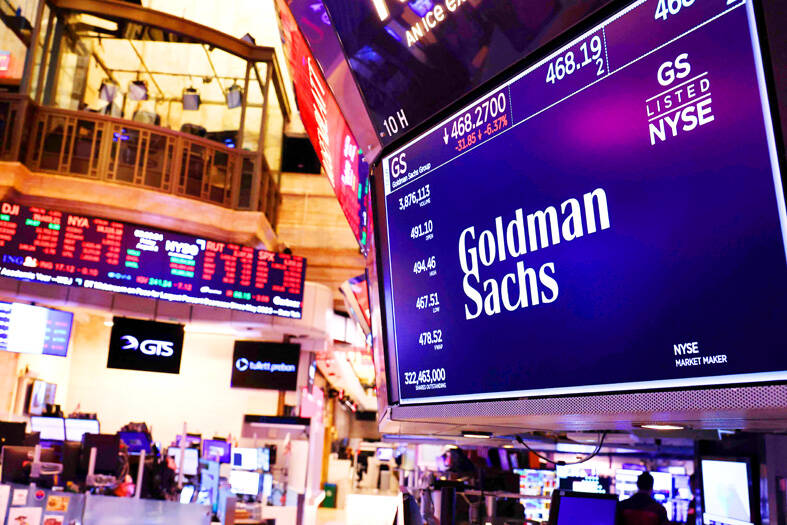Goldman Sachs Group Inc is walking away from the world’s biggest climate alliance for banks, in the latest sign that Wall Street is recalibrating its affiliation with such groups.
Goldman has decided to no longer be a member of the Net-Zero Banking Alliance (NZBA), the company said in a statement on Friday.
Firms are struggling to adapt to a deluge of increasingly fragmented environmental, social and governance (ESG) requirements from various standard-setters and jurisdictions. Goldman’s decision to leave NZBA was largely motivated by a need to comply with mandatory reporting guidelines, a person familiar with the matter said, adding that it would be helped by the rollout of the EU’s Corporate Sustainability Reporting Directive, the person said.

Photo: Getty Images via AFP
“We have the capabilities to achieve our goals and to support the sustainability objectives of our clients,” the bank said in a statement. “Goldman Sachs is also very focused on the increasingly elevated sustainability standards and reporting requirements imposed by regulators around the world.”
A spokesperson for NZBA declined to comment. Members of the group commit to achieving net zero financed emissions by 2050 at the latest and to set interim five-year decarbonization targets.
The move comes amid intense and growing pressure from the US Republican Party on such coalitions, as part of a wider attack by the party on what it has characterized as “woke” capitalism. Last week, Texas Attorney General Ken Paxton led a move to sue BlackRock Inc, Vanguard Group Inc and State Street Corp for allegedly breaching antitrust laws by using climate-friendly investment strategies to suppress the supply of coal.
That suit followed bans against ESG investing across numerous Republican-controlled states, with pressure expected to step up now that US president-elect Donald Trump is headed for a second term in the White House.
Against that backdrop, banks and asset managers have scaled back their association with high-profile climate groups.
In August, the asset management arm of Goldman said it had quit the world’s biggest climate alliance for investors, known as Climate Action 100+ (CA100+). Other firms that have quit the alliance include the asset management arm of JPMorgan Chase & Co and Pacific Investment Management Co.
On Friday, Franklin Templeton said it “won’t renew its status” as a signatory with CA100+.
CA100+, the world’s largest investor group formed to fight climate change, had been helpful in providing early-stages support, but Franklin Templeton has now built enough internal expertise around climate investing to no longer require the assistance of the group, the company said in a statement.
A separate climate alliance for insurers, NZIA, was gripped by an exodus last year, as firms responded to threats of antitrust litigation brought by US Republican state attorneys general, while a net zero alliance for asset managers suffered a blow when Vanguard, the world’s second-largest money manager, quit back in 2022.

MULTIFACETED: A task force has analyzed possible scenarios and created responses to assist domestic industries in dealing with US tariffs, the economics minister said The Executive Yuan is tomorrow to announce countermeasures to US President Donald Trump’s planned reciprocal tariffs, although the details of the plan would not be made public until Monday next week, Minister of Economic Affairs J.W. Kuo (郭智輝) said yesterday. The Cabinet established an economic and trade task force in November last year to deal with US trade and tariff related issues, Kuo told reporters outside the legislature in Taipei. The task force has been analyzing and evaluating all kinds of scenarios to identify suitable responses and determine how best to assist domestic industries in managing the effects of Trump’s tariffs, he

‘SWASTICAR’: Tesla CEO Elon Musk’s close association with Donald Trump has prompted opponents to brand him a ‘Nazi’ and resulted in a dramatic drop in sales Demonstrators descended on Tesla Inc dealerships across the US, and in Europe and Canada on Saturday to protest company chief Elon Musk, who has amassed extraordinary power as a top adviser to US President Donald Trump. Waving signs with messages such as “Musk is stealing our money” and “Reclaim our country,” the protests largely took place peacefully following fiery episodes of vandalism on Tesla vehicles, dealerships and other facilities in recent weeks that US officials have denounced as terrorism. Hundreds rallied on Saturday outside the Tesla dealership in Manhattan. Some blasted Musk, the world’s richest man, while others demanded the shuttering of his

TIGHT-LIPPED: UMC said it had no merger plans at the moment, after Nikkei Asia reported that the firm and GlobalFoundries were considering restarting merger talks United Microelectronics Corp (UMC, 聯電), the world’s No. 4 contract chipmaker, yesterday launched a new US$5 billion 12-inch chip factory in Singapore as part of its latest effort to diversify its manufacturing footprint amid growing geopolitical risks. The new factory, adjacent to UMC’s existing Singapore fab in the Pasir Res Wafer Fab Park, is scheduled to enter volume production next year, utilizing mature 22-nanometer and 28-nanometer process technologies, UMC said in a statement. The company plans to invest US$5 billion during the first phase of the new fab, which would have an installed capacity of 30,000 12-inch wafers per month, it said. The

Taiwan’s official purchasing managers’ index (PMI) last month rose 0.2 percentage points to 54.2, in a second consecutive month of expansion, thanks to front-loading demand intended to avoid potential US tariff hikes, the Chung-Hua Institution for Economic Research (CIER, 中華經濟研究院) said yesterday. While short-term demand appeared robust, uncertainties rose due to US President Donald Trump’s unpredictable trade policy, CIER president Lien Hsien-ming (連賢明) told a news conference in Taipei. Taiwan’s economy this year would be characterized by high-level fluctuations and the volatility would be wilder than most expect, Lien said Demand for electronics, particularly semiconductors, continues to benefit from US technology giants’ effort